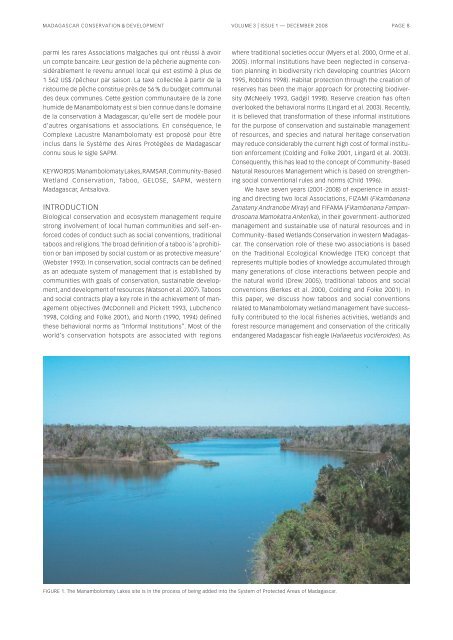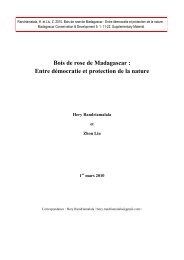Journal Madagascar Conservation - Madagascar Wildlife ...
Journal Madagascar Conservation - Madagascar Wildlife ...
Journal Madagascar Conservation - Madagascar Wildlife ...
Create successful ePaper yourself
Turn your PDF publications into a flip-book with our unique Google optimized e-Paper software.
MADAGASCAR CONSERVATION & DEVELOPMENT VOLUME 3 | ISSUE 1 — DECEMBER 2008 PAGE 8<br />
parmi les rares Associations malgaches qui ont réussi à avoir<br />
un compte bancaire. Leur gestion de la pêcherie augmente con-<br />
sidérablement le revenu annuel local qui est estimé à plus de<br />
1 562 US$ / pêcheur par saison. La taxe collectée à partir de la<br />
ristourne de pêche constitue près de 56 % du budget communal<br />
des deux communes. Cette gestion communautaire de la zone<br />
humide de Manambolomaty est si bien connue dans le domaine<br />
de la conservation à <strong>Madagascar</strong>, qu’elle sert de modèle pour<br />
d’autres organisations et associations. En conséquence, le<br />
Complexe Lacustre Manambolomaty est proposé pour être<br />
inclus dans le Système des Aires Protégées de <strong>Madagascar</strong><br />
connu sous le sigle SAPM.<br />
KEYWORDS: Manambolomaty Lakes, RAMSAR, Community - Based<br />
Wetland <strong>Conservation</strong>, Taboo, GELOSE, SAPM, western<br />
<strong>Madagascar</strong>, Antsalova.<br />
INTRODUCTION<br />
Biological conservation and ecosystem management require<br />
strong involvement of local human communities and self - enforced<br />
codes of conduct such as social conventions, traditional<br />
taboos and religions. The broad definition of a taboo is ‘a prohibition<br />
or ban imposed by social custom or as protective measure’<br />
(Webster 1993). In conservation, social contracts can be defined<br />
as an adequate system of management that is established by<br />
communities with goals of conservation, sustainable development,<br />
and development of resources (Watson et al. 2007). Taboos<br />
and social contracts play a key role in the achievement of management<br />
objectives (McDonnell and Pickett 1993, Lubchenco<br />
1998, Colding and Folke 2001), and North (1990, 1994) defined<br />
these behavioral norms as “Informal Institutions”. Most of the<br />
world’s conservation hotspots are associated with regions<br />
where traditional societies occur (Myers et al. 2000, Orme et al.<br />
2005). Informal institutions have been neglected in conservation<br />
planning in biodiversity rich developing countries (Alcorn<br />
1995, Robbins 1998). Habitat protection through the creation of<br />
reserves has been the major approach for protecting biodiversity<br />
(McNeely 1993, Gadgil 1998). Reserve creation has often<br />
overlooked the behavioral norms (Lingard et al. 2003). Recently,<br />
it is believed that transformation of these informal institutions<br />
for the purpose of conservation and sustainable management<br />
of resources, and species and natural heritage conservation<br />
may reduce considerably the current high cost of formal institution<br />
enforcement (Colding and Folke 2001, Lingard et al. 2003).<br />
Consequently, this has lead to the concept of Community - Based<br />
Natural Resources Management which is based on strengthening<br />
social conventional rules and norms (Child 1996).<br />
We have seven years (2001-2008) of experience in assisting<br />
and directing two local Associations, FIZAMI (Fikambanana<br />
Zanatany Andranobe Miray) and FIFAMA (Fikambanana Fampandrosoana<br />
Mamokatra Ankerika), in their government - authorized<br />
management and sustainable use of natural resources and in<br />
Community - Based Wetlands <strong>Conservation</strong> in western <strong>Madagascar</strong>.<br />
The conservation role of these two associations is based<br />
on the Traditional Ecological Knowledge (TEK) concept that<br />
represents multiple bodies of knowledge accumulated through<br />
many generations of close interactions between people and<br />
the natural world (Drew 2005), traditional taboos and social<br />
conventions (Berkes et al. 2000, Colding and Folke 2001). In<br />
this paper, we discuss how taboos and social conventions<br />
related to Manambolomaty wetland management have successfully<br />
contributed to the local fisheries activities, wetlands and<br />
forest resource management and conservation of the critically<br />
endangered <strong>Madagascar</strong> fish eagle (Haliaeetus vociferoides). As<br />
FIGURE 1. The Manambolomaty Lakes site is in the process of being added into the System of Protected Areas of <strong>Madagascar</strong>.



